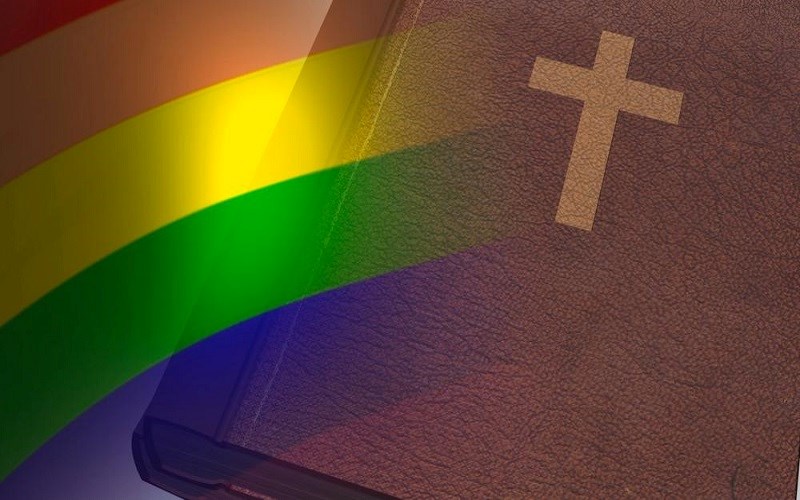

Homosexual activists and their sympathizers within the church have been busy trying to undermine the clear message of Scripture on one of the most controversial topics of our day: homosexuality. This has resulted in a great deal of confusion for many Christians.
What does the Bible actually say? Activists have taken great pains to provide alternative interpretations of the Biblical passages that seem to clearly condemn homosexuality.
Of course, the obvious place to start is Sodom and Gomorrah. The familiar tale of the duo of doomed cities, recounted in Genesis 18 and 19, has made Sodom and Gomorrah synonymous with divine judgment. The unrighteousness of those cities had grown to the point that God desired to “sweep away” all who lived there (Gen. 18:20, 23).
The cities have become synonymous with something else, too: homosexuality. In fact, the word sodomy, which generally refers to unnatural sex acts (especially homosexual anal intercourse) is derived from the name of the city of Sodom.
This association comes from the events of Genesis 19. When two angels, in the form of men, came to Sodom to stay with Lot, the men of the city surrounded the house and asked, “Where are the men which came in to thee this night? Bring them out unto us, that we may know them” (vs. 5, KJV).
Lot pleaded with them to reconsider their request, and – shockingly – even offered them his two virgin daughters instead. The men again demanded that the two newcomers be brought out, and even threatened Lot, after which the angels pulled Lot to safety and warned the man of God to take his family and flee Sodom. Fiery judgment then engulfed the two cities.
A request for credentials?
With such a Biblical event casting its shadow over the theological landscape, how could gay advocates sidestep the obvious implication that God considered homosexuality a sin?
Some simply deny that any type of sexuality – homosexual or heterosexual – is in view in the Sodom and Gomorrah saga. For example, in his book, Homosexuality and the Western Christian Tradition, Dr. Sherwin Bailey argued that the Hebrew word translated “know” in this verse does not refer to sex at all. Instead, the request on the part of the townsmen to “know” the visitors was merely a request to become acquainted with Lot’s guests, especially since they were outsiders.
A proper exegesis of this passage reveals the ludicrous nature of this argument. Lot responded to the initial request by beseeching the men, “Please, my brothers, do not act wickedly” (vs. 7, NAS). This is hardly a comprehensible statement if all the men wanted to do was meet Lot’s guests and start up a conversation.
Furthermore, as P. Michael Ukleja argued in Bibliotheca Sacra, with such a restricted meaning for “know,” Lot’s offer of his daughters to the men of the city (itself a despicable act) would make no sense either. Ukleja said a “reply to a demand for credentials” with an offer of virgin daughters would be inexplicable.
Rape and power?
The more common approach for activists, however, has been to argue that the sin here in Genesis is not homosexuality per se, but homosexual rape.
“Violence – forcing sexual activity upon another – is the real point of this story,” said lesbian English professor Virginia Ramey Mollenkott, co-author of the book Is the Homosexual My Neighbor?
Mollenkott is not completely off the mark, for the story does demonstrate that the men of Sodom, after being rebuffed by Lott, fully intended to sexually brutalize Lott’s visitors.
However, Mollenkott missed the obvious: What if Lott’s two visitors had been agreeable to the initial suggestion of carnal knowledge with the men of the city? There is nothing in the Genesis account to suggest that the resulting homosexual orgy would have been forced. The homosexuals wanted sex with the strangers, and they would take it any way they could get it; but they were homosexuals.
In any case, it was not that one incident alone that led to the demise of Sodom and Gomorrah. As clearly seen in Genesis 18, God had already stated that the sin of the cities was “exceedingly grave” (vs. 20). Even before the two angels showed up in Sodom, the Lord had already targeted the cities for destruction. The divine intention to “sweep away” all who lived there (vs. 23) was what led Abraham to plead for mercy in that passage’s memorable example of intercession.
Despite the protestations of gay activists to the contrary, homosexuality clearly was a prevalent sin in Sodom and Gomorrah. Moreover, the New Testament epistles of 2 Peter and Jude link Sodom’s guilt to carnality and sexual perversion – not rape.
In 2 Peter 2, the apostle warns that the destruction of the doomed cities should serve as an example to the wicked of every generation (vs. 6). Lott, he said, continually witnessed “the sensual conduct of unprincipled men,” who, among other things, “indulge the flesh in its corrupt desires” (vv. 7, 10).
Jude 7 makes the sin of Sodom and Gomorrah even more explicit: the inhabitants “indulged in gross immorality and went after strange flesh.” What could be stranger than men fornicating with other men?
While the two cursed cities may have been judged for more than their homosexuality, there is no legitimate way to remove homosexuality from the list of sins that doomed them.
An inhospitable folk?
Other activists attempt a third strategy to deflect the warning of the Genesis 19 account. The late Rev. Peter J. Gomes, the openly homosexual Plummer Professor of Christian Morals at Harvard University, also insisted on reinterpreting the Sodom and Gomorrah story. In The Good Book: Reading the Bible with Heart and Mind, which argues for Christianity’s acceptance of homosexuality, Gomes said that even Jesus “was under the impression that Sodom was destroyed because it lacked hospitality.”
His proof? Gomes cited Matthew 10, in which the Lord Jesus prepared His disciples to go forth and preach the gospel among the cities of Israel. Some cities, of course, would reject the message of the kingdom, but the disciples were simply to turn away from them.
“Truly I say to you,” Jesus warned ominously, “it will be more tolerable for the land of Sodom and Gomorrah in the day of judgment, than for that city” (vs. 15). In Gomes’ mind, Jesus’ reference to the destruction of the doomed cities is a warning against inhospitality.
Gomes exegesis was inexcusably poor. Jesus did not use the judgment upon Sodom and Gomorrah as an indictment against inhospitality, but as a warning against rejecting the gospel. As Brian Fitzpatrick argued in the Lambda Report, it is the severity of the Old Testament judgment that is in view, not the reasons for it.
Ironically, in turning to Matthew 10 in an attempt to excuse Sodom and Gomorrah, Gomes laid the groundwork for his own judgment. In rejecting the necessity of repentance (by homosexuals) for entrance into the kingdom, he placed himself in the position of the very cities to which Jesus referred in Matthew 10.
Homosexual activists like Gomes, by turning a blind eye toward the obvious meaning of Scripture, run the risk of committing the most deadly sin of all – unbelief.
Next: Does Ezekiel 16 contradict Genesis 19?

